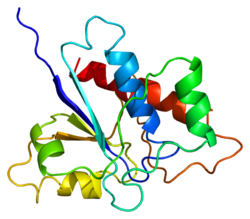Clinical significance
Clinically, increased expression of ACP1 is a biomarker for poor prognosis in prostate cancer has been linked to worse clinical behaviour of prostate cancer, possibly outperforming the widely used Gleason grading system with respect to this important parameter. [6] Also in other cancers, e.g. colon cancer, high ACP1 protein levels are linked to aggressive disease. [7] It has been suggested that ACP1 acts as a bona fide oncogene, but for now this notion remains unproven even if ACP1 overexpression drives cells towards a Warburg effect-like glycolytic phenotype. [8] Apart from cancer, ACP1 has also been linked to osteoporosis as the enzyme plays an important role in the interaction of the osteocyte with the bone environment, [9] while its inhibition appears useful for counteracting experimental [venous thromboembolism]. [10] Currently, there are no clinically approved inhibitors that allow targeting ACP1 in patients.
This page is based on this
Wikipedia article Text is available under the
CC BY-SA 4.0 license; additional terms may apply.
Images, videos and audio are available under their respective licenses.
















